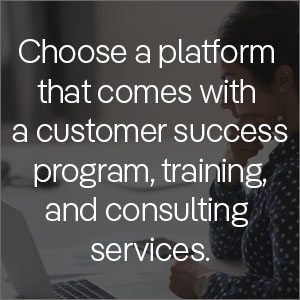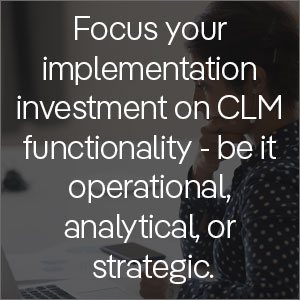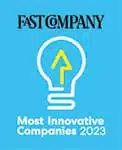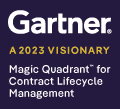Let’s assume you have identified all of the use cases for a contract lifecycle management (CLM) solution in your legal department and company. You fully understand the value metrics by which you will measure success. Your work on your business case is well underway. Now, it is time to assess various CLM systems, creating a short list of vendors that can meet your unique business needs.
Recently, we published a white paper about how to properly view the market landscape, evaluate solutions, and define your contract management system (CMS) needs. Written by Richa Kaul, ContractPodAi’s Chief Strategy Officer, it provides recommendations and tactical frameworks for general counsels (GCs) and legal teams interested in acquiring a CMS. Whether you are heading your company’s search for a system, or deciding on a vendor and solution, yourself, you will find this paper especially helpful.
Here are five key categories — based on our valuable guide — that you should consider during your CLM evaluation process. These should be top of mind while issuing a formal RFP or inviting vendors to present their solutions more directly.
1. Product Functionality
Preliminary research into CLM features and functions is always recommended. You can do this on vendors’ websites directly, or through third-party customer and analyst review sites. When you finally enter into discussions with vendors, they will likely try to understand your strategic goals and contract management use cases, before presenting their own solutions.
Remember, though, that scalability and precision are often neglected in functional assessments. Businesses with complex contract clauses, large repositories of agreements, or multi-step business processes must prioritize the kind of scalability and precision that artificial (AI) and machine learning offer.
In many growing businesses, there is a need to scale up contract file storage and user volume and scale-out departmental use cases, like HR, procurement, or partner contract management. Or, to add automated contract review or approval functionality with AI bots and robotic process automation (RPA.) Once you share your use case or business value information with vendors, they can provide a tailored demonstration of operational CLM functions, including:
- Contract repository, search, and document profiling
- Redlining
- Contract templates
- E-Signatures
If you are evaluating more advanced platform or suite vendors, you should consider more analytical functions, such as:
- AI-augmented contract assembly and authoring process for different contract types
- Analytics and dashboards for compliance, completion, and renewal tracking
- Secure collaborative negotiation portals, version control, and virtual assistant reviews for negotiation cycles
Or strategic value drivers like:
- Integration with applications like your CRM or ERP platforms
- Desktop and mobile user and administrator experiences
Nevertheless, it is important to understand the products’ current states and review vendors’ developmental roadmaps. After all, there may be functions — like the ones listed above — that may become important before long.
There may be functional gaps that you need to work around, too. But letting vendors know about these functional gaps can help them determine if their product or platform will meet your needs — now or in the near future. Or if other solutions in the marketplace will better serve you. Even if their solutions meet most of your requirements, it never hurts to ask vendors questions about their functional plans also.
More details about contract management functionality are included in our white paper mentioned above.
2. Implementation and Configuration
When deploying a CLM platform for your business user community, it is necessary to tailor it to your individual needs and connect it to your existing digital ecosystem. However, that is not an easy task. Setting up the system to mirror the real-world business activities of the legal, finance, sales, and procurement departments, for instance, requires time and experience.
What is crucial, then, is choosing a platform that comes with a customer success program, training, and consulting services. These can make all the difference between getting the strategic and financial value returns you are seeking from contract management and starting over with another solution in a few years. At first, look for CLM vendors that offer valuable content to their paying subscriber community. Think thought leadership around change management. Or best practices, success stories, and testimonial videos.
Common implementation services, which provide full operational, analytical, and strategic support, include:
- Migration or uploading of legacy contract records (Operational)
- Setup of custom reports to complement standard, pre-configured reports (Analytical)
- Development of metadata profile standards for search (Analytical)
- Training and testing of virtual contract review agent on a set of contracts or templates (Strategic)
- Integration with applications like Salesforce CRM and email platforms like Outlook (Strategic)
With these implementations, configuration, and training services, companies can accelerate user and administrator onboarding. Also, they can tailor the application to the way their business operates in the physical world.
3. Customer Value and Commitment to Value Delivery
There are many ways in which businesses gain returns on their CLM investments. A financial services firm may meet regulatory audit requirements and avoid fines for non-compliance. A pharmaceuticals company may accelerate joint venture negotiations and bring a critical drug to market quicker. Minimizing the burden they place on their legal team, a software company could streamline their customer contract assembly and legal review processes, too.
Quite often, a vendor’s consulting partner and software alliance ecosystems contribute to their ability to retain their client base also. When a CLM system is an integral part of a company’s business — across legal, procurement, and sales functions — unseating that platform is a rather difficult process.
Ultimately, the CLM solution provider you evaluate should be able to provide evidence that their solution can deliver value. First, focus your implementation investment on related CLM functionality, whether it is operational, analytical, or strategic in nature. Some vendors may agree to add value-based contract clauses to your subscription to their platform. And these could ensure financial penalties if certain milestones are not met.
4. Customer Retention and Reviews of CLM Solutions
CLM solution providers, with SaaS business models, must be laser-focused on minimizing customer churn and retaining their client base. Realistic customer retention ranges between 40 and 60 percent, generally, although some vendors claim rates as high as 90 percent.
Failed implementations and poor project planning are leading reasons why companies switch CLM providers after the first year. This has resulted in an increased focus on customer success programs, including regular training, frequently scheduled customer check-ins, and other value-added support services.
Additionally, some vendors now disclose customer retention statistics about their largest customers. However, that is less than common.
5. Vendor Funding and Company History
Let’s face it, AI-powered CLM software providers have been disruptive. Previously, the contract management market was dominated by vendors offering point solutions and companies offering add-ons to their services. Now, newer and more traditional players exist in this nascent space together.
Researching companies’ financial stability, senior leadership team, and domain expertise is crucial to choosing the best CLM solution for your company, then. After all, you do not want to lose access to your legal documents simply because your service provider could not pay their cloud services bill or establish a large enough customer base to cover their costs.
Look for a CLM provider, which has a baseline of US$40 million in funding; has been in the contract management system (CMS) business for at least five years; and has been able to demonstrate a diverse portfolio of companies that resemble your own, in terms of business size and annual revenue earnings.
In the next blog post in this series, we will help you apply your newfound knowledge of CLM vendors in the marketplace — and define your CLM requirements for the short- and long-term evolution of your business.
In the meantime, learn more about selecting a CLM vendor and solution strategically. Download a copy of our latest white paper, “How to Choose a Contract Management Solution,” today.
Further Reading:









